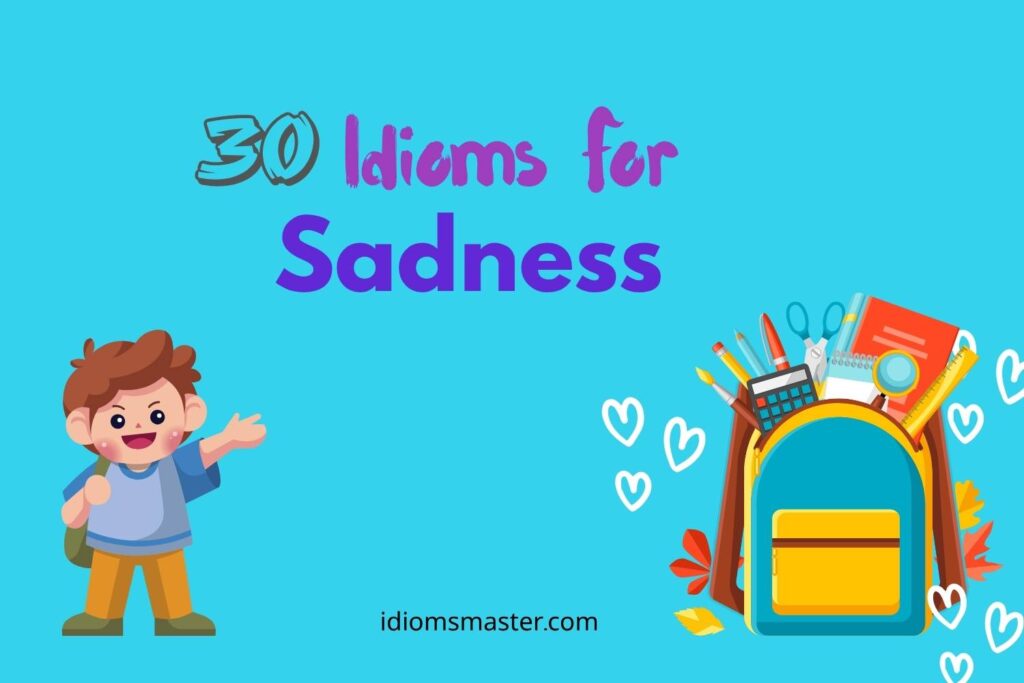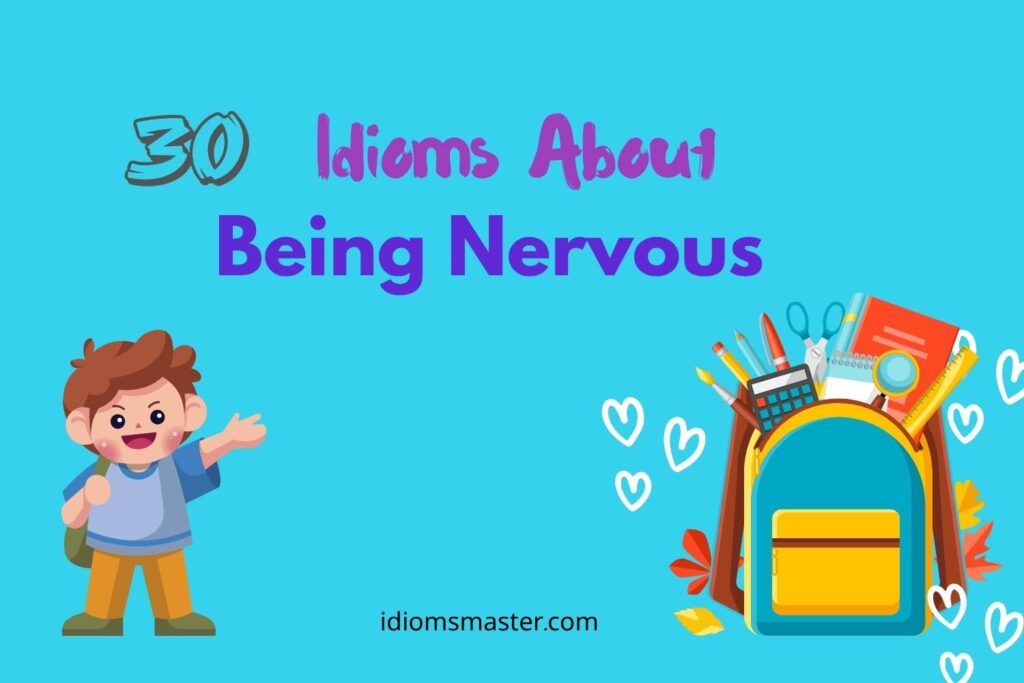Everyone feels sad sometimes. Maybe it’s because of a lost toy, a fight with a friend, or a bad day at school. When people talk about sadness, they often use idioms. Idioms are phrases that don’t mean exactly what they say, but they help us show our feelings in a stronger or clearer way.
In this article, we’ll learn idioms for sadness. These idioms can help us explain how we feel when things don’t go right. By using these sayings, we can share our feelings better and understand others more, too. Let’s take a look at these expressions and see how they describe sad times in everyday life.
Idioms for Sadness
1. Down in the dumps
Meaning: Feeling sad or depressed.
Samples: She’s been down in the dumps all day. / He felt down in the dumps after the test.
To Put it Another Way: Feeling low. / Not happy.
2. Feeling blue
Meaning: Feeling sad.
Samples: I’m feeling blue since my friend moved away. / She felt blue after her team lost.
To Put it Another Way: Feeling sad. / Not cheerful.
3. Heavy heart
Meaning: Feeling very sad or full of sorrow.
Samples: He left the party with a heavy heart. / I wrote the letter with a heavy heart.
To Put it Another Way: Feeling deep sadness. / Very upset inside.
4. Cry your eyes out
Meaning: Cry a lot.
Samples: She cried her eyes out after watching the sad movie. / He cried his eyes out when his pet got lost.
To Put it Another Way: Cried a lot. / Couldn’t stop crying.
5. Heart sinks
Meaning: Feel suddenly very sad or disappointed.
Samples: My heart sank when I saw the broken toy. / Her heart sank after the bad news.
To Put it Another Way: Felt very let down. / Got really sad quickly.
6. Down and out
Meaning: Feeling hopeless or without hope.
Samples: He was down and out after failing the game. / She felt down and out when her plans were canceled.
To Put it Another Way: Feeling very low. / Feeling really defeated.
7. Shed tears
Meaning: Cry a little or softly.
Samples: She shed tears when the story ended. / He shed tears at the goodbye.
To Put it Another Way: Cried a little. / Quietly cried.
8. Feel low
Meaning: Feel sad or not good.
Samples: I’ve been feeling low this week. / She felt low after missing her bus.
To Put it Another Way: Not feeling happy. / Feeling down.
9. Have a lump in your throat
Meaning: Feeling like you might cry.
Samples: I had a lump in my throat during the sad part. / He got a lump in his throat saying goodbye.
To Put it Another Way: Almost crying. / Feeling choked up.
10. Rain on your parade
Meaning: Ruin your good mood or plans.
Samples: The bad weather really rained on our parade. / His comment rained on my parade.
To Put it Another Way: Made me feel bad. / Ruined the moment.
11. A face like a wet weekend
Meaning: Looking very sad.
Samples: He had a face like a wet weekend after losing the game. / She walked in with a face like a wet weekend.
To Put it Another Way: Looked really upset. / Looked gloomy.
12. Drown in sorrow
Meaning: Feel overwhelmed by sadness.
Samples: She felt like she was drowning in sorrow. / He drowned in sorrow after the loss.
To Put it Another Way: So sad it’s hard to handle. / Overcome with sadness.
13. Tears well up
Meaning: Start to cry or feel like crying.
Samples: Tears welled up in her eyes during the speech. / He had tears welling up when he got the news.
To Put it Another Way: Tears were coming. / Starting to cry.
14. Take it hard
Meaning: React strongly with sadness.
Samples: He took the news hard. / She took it hard when her friend moved.
To Put it Another Way: Felt it deeply. / Got really sad.
15. Cry over spilled milk
Meaning: Be sad about something you can’t change.
Samples: There’s no use crying over spilled milk. / He cried over spilled milk after dropping his lunch.
To Put it Another Way: No point in staying sad about it. / It already happened.
16. Bring someone to tears
Meaning: Make someone cry.
Samples: The movie brought her to tears. / His kind words brought me to tears.
To Put it Another Way: Made someone cry. / Caused tears.
17. Choked up
Meaning: Too emotional to speak.
Samples: I got choked up during the goodbye. / He was choked up after the award speech.
To Put it Another Way: Couldn’t speak from sadness. / Too emotional to talk.
18. Break your heart
Meaning: Make you feel deeply sad.
Samples: It broke my heart to see her cry. / Losing the dog broke his heart.
To Put it Another Way: Hurt badly emotionally. / Very upsetting.
19. Eat your heart out
Meaning: Feel jealous or sad.
Samples: She watched others win and ate her heart out. / He ate his heart out during the party he missed.
To Put it Another Way: Felt sad or left out. / Was upset by what others had.
20. Feel crushed
Meaning: Feel very disappointed or broken.
Samples: He felt crushed after losing. / She was crushed when she wasn’t picked.
To Put it Another Way: Deeply sad. / Very disappointed.
21. All cried out
Meaning: Too tired or numb to cry anymore.
Samples: After hours of crying, she felt all cried out. / He was all cried out by bedtime.
To Put it Another Way: No more tears left. / Too tired to be sad.
22. Feel blue
Meaning: Feel down or sad.
Samples: He felt blue after hearing the news. / I feel blue when I’m alone.
To Put it Another Way: Feeling unhappy. / A little sad.
23. Fall apart
Meaning: Lose control due to sadness.
Samples: She fell apart after hearing the news. / He fell apart at the funeral.
To Put it Another Way: Lost control from emotion. / Couldn’t hold it together.
24. Not a dry eye in the house
Meaning: Everyone cried.
Samples: After the speech, there wasn’t a dry eye in the house. / The story left not a dry eye in the room.
To Put it Another Way: Everyone cried. / Very emotional moment.
25. Wear a long face
Meaning: Look sad or unhappy.
Samples: He wore a long face all morning. / Why the long face?
To Put it Another Way: Looked sad. / Seemed down.
26. Touched a nerve
Meaning: Caused sadness by saying or doing something.
Samples: That question touched a nerve. / His words touched a nerve with her.
To Put it Another Way: Made someone feel hurt. / Caused an emotional reaction.
27. Sing the blues
Meaning: Complain or talk about being sad.
Samples: He was singing the blues after his team lost. / She sang the blues when her plans changed.
To Put it Another Way: Complained sadly. / Talked about sadness.
28. Gutted
Meaning: Very disappointed or heartbroken.
Samples: I was gutted when I didn’t win. / She felt gutted after the loss.
To Put it Another Way: Very upset. / Felt broken.
29. Carry a heavy load
Meaning: Feel deep emotional sadness.
Samples: He’s carrying a heavy load right now. / She carries a heavy load after the loss.
To Put it Another Way: Full of sadness. / Emotionally heavy.
30. In the depths of despair
Meaning: Feeling extremely sad.
Samples: He was in the depths of despair after the accident. / She fell into the depths of despair.
To Put it Another Way: Extremely sad. / Deeply upset.
Find the Topics: Idioms for Sadness
Reading Passage: “The Lost Bracelet”
Emma had been looking forward to wearing her grandmother’s bracelet to the school party. But when she opened her jewelry box, her heart sank it was gone. She felt crushed and sat on her bed with a heavy heart. Tears welled up in her eyes as she remembered how special the bracelet was.
Emma’s mom came in and saw her daughter’s face like a wet weekend. “Don’t cry your eyes out,” she said gently. But Emma was already all cried out. “I just feel so down in the dumps,” she whispered, feeling low.
At school, her friends tried to cheer her up. “Don’t worry,” said Mia, “it’s no use crying over spilled milk. Maybe it will turn up.” But Emma still wore a long face the rest of the day.
Your Task:
Can you underline or list all 8 idioms for sadness used in the story?
Answer Key
- Her heart sank
- Felt crushed
- Heavy heart
- Tears welled up
- Face like a wet weekend
- Cry your eyes out
- All cried out
- Down in the dumps
Conclusion
Sadness is something we all feel sometimes. Idioms help us express these deep feelings in a simple and strong way. Whether you’re feeling low, crying your eyes out, or have a heavy heart, these phrases help others understand how you feel.
By learning idioms for sadness, we can talk about emotions more clearly. They help us share feelings with others in a kind and thoughtful way. Try using one of these idioms when you need to talk about sad moments; it can help make your message more meaningful.




